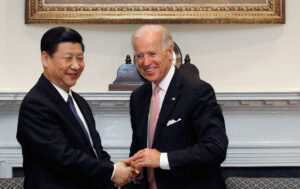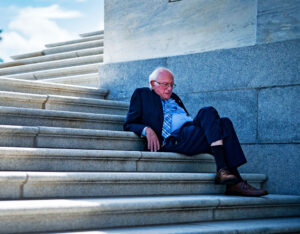“We have always known that heedless self-interest was bad morals, we now know that it is bad economics,” said Franklin D. Roosevelt at the height of the Great Depression. It is a lesson that President Joe Biden has taken to heart. He has gone to great lengths to present himself as the heir of FDR, and came to power offering Rooseveltian-style comfort and hope to the American people during the Covid pandemic. But for some reason, the more he tries to emulate America’s most beloved Democratic president, the less popular he becomes.
To be fair to Biden, he is the truest successor of FDR yet. Like Roosevelt, he came into office at a time of overwhelming economic crisis and despair. And like Roosevelt, he realised that nothing short of a programme of economic reconstruction as ambitious as the New Deal would suffice to address America’s long-term and corrosive economic suffering. It was not enough, in his eyes, simply to banish the virus and restore the economy to its pre-Covid state. He needed to restore faith in American democracy and the American dream.
At the heart of Bidenomics is the idea that 21st-century America is in the grip of its own economic crisis, this one emerging far more slowly and unevenly than the Great Depression, but with results that were just as disfiguring. In the past 30 years, a globalised world of free markets and unregulated capitalism has generated a vast economic gulf between deindustrialised rural and small-town America, and the vast metropolises. The resulting economic suffering and social disintegration, Biden observed, had made possible the rise of strongmen such as Trump who captivated angry and alienated portions of the population with their faux-populism and attacks on distant elites.
The only way to address the root of this populist anger and alienation, Biden thought, was by implementing a vast Rooseveltian public spending plan to bring manufacturing jobs back to America’s deindustrialised regions. His economic package — which included a mammoth trillion-dollar physical infrastructure bill, a $400 billion Chips and Science Act to re-shore the manufacturing of computer chips, and a $400 billion green energy bill, the largest investment the US had ever made in green energy — rivalled some of the biggest accomplishments of the early New Deal.
In other ways, too, Biden has shown himself a careful student of Roosevelt. He has welcomed elements of a reawakened Left into his administration, cognisant that the greatest progressive advances by the Democratic Party across the last century have resulted from the willingness of the party’s centre to work with its Left-wing. In contrast to Hillary Clinton and Barack Obama, who had both snubbed the Left, Biden embraced Bernie Sanders’s support for his election.
But here the similarities of Bidenomics and Roosevelt’s New Deal come to an end. Whereas Roosevelt pushed nearly the entirety of his legislative programme through Congress — much of this in the legendary First 100 Days of his administration — major parts of Biden’s programme have failed. That Biden hit a wall is not surprising, given that he had a small majority in the House and the slimmest possible majority in the Senate. Roosevelt by contrast enjoyed huge majorities in both the House (313 to 122) and Senate (58 to 37).
Their administrations have diverged in a second, more surprising, way. While Roosevelt’s popularity soared as his economic recovery programme faltered, Biden’s plummeted as his economic plan succeeded. In Roosevelt’s first year and a half in office, the economy ticked up briefly, then plunged into depression once again. His legislative programmes had generated intense hope; their early failure spread discontent and then social uprisings. Workers went on strike in large numbers. Populist demagogues — including Louisiana senator Huey Long and radio priest Father Coughlin — attracted millions to their crusades by criticising the New Deal for not doing enough for the “little guy”. However, very little of this populist fury was directed at Roosevelt himself. In the off-year elections of 1934, the Democrats’ Congressional majorities actually increased, deepening FDR’s control of Congress.
Biden’s fate has been the opposite. As the economy soars, his popularity has sunk. Thanks to Biden, there’s now a palpable dynamism in the US economy, one felt neither in Britain nor Europe, nor in Thirties America under Roosevelt: unemployment has been below 4% since April 2022; economic growth in the third quarter of 2023 exceeded 5%, a level that mature industrial economies of the West no longer expect to achieve; and the number of manufacturing jobs in the US is the highest since 2008. And yet, Biden’s popularity has crashed: his approval rating now stands at a miserable 37%, down 20% since April 2021.
Biden’s age and perceived infirmity have undoubtedly contributed to this plunge. Yet when Roosevelt ran for a fourth term as president in 1944, though his ill health had led him near death’s door, few Americans seemed to care. A soaring inflation rate — the highest in 50 years — that erupted under Biden’s watch has no doubt damaged his reputation in ways that have nothing to do with his age. But one would think that he would get some credit for cutting the inflation rate from its 9% peak in 2022 by nearly two thirds. None has yet been forthcoming.
What was it about Roosevelt, or the Thirties, that allowed him to suffer defeats on the economic front without losing popularity? And how was he able to tap into what we might call the American imaginary — the section of the political soul where Americans fashion their hopes and dreams — in ways that Biden can’t? Roosevelt was certainly a more ebullient figure and a more eloquent speaker than Biden, but he was also living in a different era. He arrived in the White House at a moment when the 20th-century’s “age of reform”, to use Richard Hofstadter’s phrase, was far more advanced than its 21st-century counterpart.
Three aspects of the Roosevelt era stand out as different from today. First, the magnitude of the Great Depression. Unlike the 2008 financial crisis, which hit some regions worse than others, the Great Depression came for every American state, and every group of people. It also went on for far longer than the Covid pandemic, which helped FDR, a politician skilled at giving comfort and generating hope in time of despair, build an enduring appeal. Indeed, Biden, whose own empathetic instincts are acute, enjoyed his greatest popularity when the threat of Covid was most severe and widespread — in other words, when life in America most closely resembled the Great Depression.
Then there’s the fact that Roosevelt was able to draw the metaphorical borders of the national community more tightly than can be done today. In the Thirties, the gates were shut tight to immigrants: Mexicans were allowed in, but they were just as easily deported when no longer wanted; feminism and an early gay movement had faded; patriarchy and heteronormativity reigned just about everywhere. Moreover, FDR made a deal with the devil — the southern barons of the Democratic Party who controlled Congress. The latter agreed to support New Deal programmes so long as FDR didn’t disturb the racial hierarchies and white supremacy that structured southern life. These moves shrank what David Hollinger has called the “circle of the we” — those considered to be full members of (and able to make full claims on) the national political community.
What’s more, unlike Biden, Roosevelt was heir to a 30-year-long effort to reform American capitalism, helped by the presidencies of his cousin Teddy and his Democratic predecessor in the White House, Woodrow Wilson. The movement that Biden leads, by contrast, is far younger and more naïve, with limited experience of power. It was Theodore Roosevelt and Wilson, not FDR, who broke with the economic orthodoxy of their predecessors, as Biden is now the first to break with the neoliberal policies of Clinton and Obama. And it’s worth remembering that prior to FDR’s presidency, the progressive movement had lost more battles than it had won. Perhaps Biden and his Democratic Party will go through a similar cycle of defeats before achieving enduring victories. Donald Trump is certainly intent on laying waste to Biden’s economic programme if he wins in 2024.
It took decades for the Democrats to build enough support to reform capitalism under Franklin Roosevelt. But the New Deal would never have succeeded had warring cultural tribes in America not put aside some of their differences in order to unite over a common political cause. Consider the scene that greeted Roosevelt when he appeared at the Democratic Party Convention in New York City in June 1924. This moment marked Roosevelt’s return to active political life after a devastating encounter with polio that cost him the use of his legs. On the evening of 26 June, Roosevelt made his way to the convention podium, supported by unwieldy steel leg braces, to put the name of Al Smith in nomination. Al Smith then battled his opponent William Gibbs McAdoo for 103 ballots across two weeks in an unbearably hot Madison Square Garden, before both men gave up, and shifted their support to a milquetoast candidate, John Davis, who then got crushed in the general election.
The divisions that Roosevelt encountered in 1924 were as bitter as any today: between Catholics and Protestants, between urban and rural districts, between “wets” and “drys”, between the North and the South, between the immigrant and the native born, between liberals and the KKK. These divisions then seemed insurmountable, especially in the Democratic party. There were grounds for thinking that the Democrats would never again win a Congressional majority or elect a president. Yet less than 10 years later, Democrats pushed aside their “insurmountable” differences. Americans who hated each other were now willing to come out of their bunkers and find common ground. Roosevelt helped to facilitate that process: he had the political skills, to be sure; he was assisted by the magnitude of the Great Depression, which thrust so many Americans of different ethnic, religious, and racial backgrounds into similar conditions of economic precarity. But Roosevelt, witness to the calamity of 1924, also understood that he had to find a way to temper the culture wars.
The cultural challenge that confronts Biden is more difficult. Roosevelt’s Republican predecessors had shut the country’s immigrant gates in the Twenties, saving FDR and his party from having to wade into that contentious issue themselves. Because racial equality is now a core commitment of the Democratic Party, the Roosevelt formula of addressing class inequality while marginalising issues of racial inequality cannot, and should not, be redeployed. But the higher level of difficulty that confronts Biden does not render his challenge — or that of his party — impossible. Culture wars wax and wane. And America is currently witnessing a possible waning in one very unexpected place: the coming together of women across the political, racial, and ethnic spectrum to defeat radical Republican measures in state legislatures to outlaw all access to abortion. These alliances of liberal and conservative women fuelled an unexpected surge in Democratic victories in the 2022 elections, and are likely to do so again in 2024.
This surprising alliance of Democratic and Republican women may not be enough to propel Biden to a second term. But should he lose in 2024, it would be wrong to regard his defeat as the end of his political undertaking. It may make sense to view the Biden presidency as the beginning, rather than as the culmination, of a 21st-century project of economic reconstruction. The heyday of reconstruction on this scale may lie in the 2030s, when an heir to Biden may play a role similar to the one that Roosevelt took on in the Thirties: learning from his predecessors, and accurately sizing up what needs to be done to bring to America, once again, a large and transformative Democratic majority.
Disclaimer
Some of the posts we share are controversial and we do not necessarily agree with them in the whole extend. Sometimes we agree with the content or part of it but we do not agree with the narration or language. Nevertheless we find them somehow interesting, valuable and/or informative or we share them, because we strongly believe in freedom of speech, free press and journalism. We strongly encourage you to have a critical approach to all the content, do your own research and analysis to build your own opinion.
We would be glad to have your feedback.
Source: UnHerd Read the original article here: https://unherd.com/





